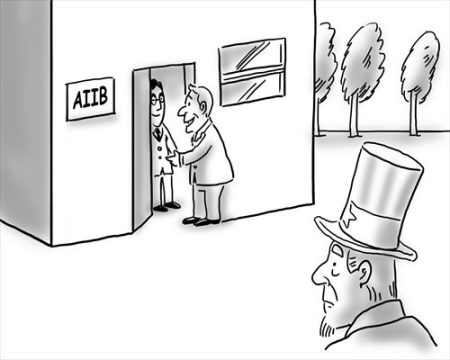
Illustration: Liu Rui/GT
In a sign of rapprochement with China, the administration of Canadian Prime Minister Justin Trudeau on Wednesday announced its decision to apply to join the China-backed Asian Infrastructure Investment Bank (AIIB). Canada, a key U.S. ally, could become the first North American state to assume AIIB membership.
More than four decades after his father began paving the way for Sino-Canadian relations in the 1970s, Trudeau is set to open a new era in the bilateral relations. Unlike his predecessor Stephen Harper, who tied Canada closely to the U.S., Trudeau has opted for a more balanced diplomacy since he took office. The new prime minister aims to rebalance the Harper government's pro-U.S. policies, diluting the excessive political flavor attached in its dealings with China and securing a balance between China and the U.S..
Under Harper's value-based China policy, Sino-Canadian relations encountered myriad stumbling blocks. The Conservative government's approach to developing relations with China was clouded by political prejudices, hostility toward Chinese State-owned enterprises and a failure to recognize the innumerable development opportunities cooperation with China offers. It also left the international community with the strong impression that Canada was unable to disengage itself from the U.S. influence on its foreign policy.
Trudeau vowed to reset Sino-Canadian ties, bringing the bilateral relationship back on a healthy track of concentrating more on economic and trade cooperation rather than political squabbling. Canada had two options to seek a breakthrough, one was to apply for AIIB membership and the other was to foster the signing of the China-Canadian free trade agreement. Compared to the latter, which requires a time-consuming negotiation process, the AIIB application was an easy way to make a stir. It signifies Canada's resolution in bringing the bilateral relationship forward.
Important U.S. allies and partners such as the UK, Germany and France have all joined the AIIB. Canada therefore didn't face much pressure from the U.S.. Joining the AIIB can not only win Ottawa more investment opportunities in the Asia-Pacific region, but also could move Sino-Canadian bilateral political ties ever closer.
In the long run, Canada will seek to reach a free trade agreement with China with the aim of exploring new trade opportunities amid the lackluster global economy. Despite snags over labor, the environment and concerns linked to Chinese State-owned enterprises, the number of Canadians who support an FTA with China is growing. According to the Globe and Mail, a recent poll commissioned by the Asia Pacific Foundations of Canada and conducted by EKOS Research Associates found that 46 percent of Canadians surveyed support the idea of an FTA with China, up from 36 percent in the foundation's 2014 report.
Noticeably, Canadians have a contradictory attitude toward the China-Canada FTA. They long for development opportunities while harboring misgivings about Chinese investment. Should their concerns be defused, the negotiation process will be quickened.
By deepening economic and trade cooperation with China, Trudeau has carried out a relatively independent diplomacy despite U.S. pressure. He will follow his father, giving the priority to economic cooperation when developing relations with China and playing down sensitive political topics such as human rights. This will lay the foundation for a smoothly improving bilateral relationship.
However, Canada, as a U.S. ally, is unlikely to totally get rid of U.S. influence in its policymaking. It's closely tied to the U.S. over security issues and it is impossible for it to have an absolutely independent diplomacy. This deserves vigilance from China.
Canada now needs to strike a balance between maintaining sound economic and trade ties with China and consolidating its alliance with the U.S..
By Tang Xiaosong
The author is director of the Center for Canadian Studies at Guangdong University of Foreign Studies.


















































